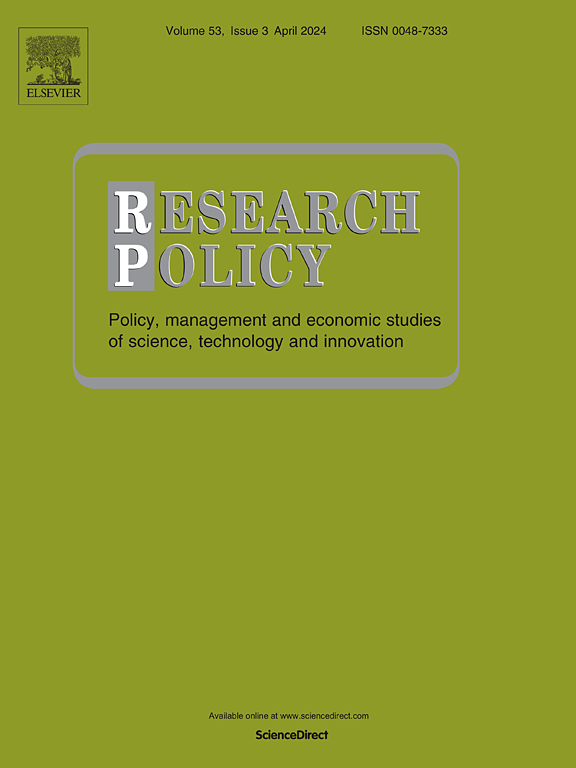流动性及其对科学认知的影响。瑞士生物学家的面部分析
IF 8
1区 管理学
Q1 MANAGEMENT
引用次数: 0
摘要
本文旨在了解学术、机构、地理和学科流动的传记动态及其对科学认识的影响。我们收集了2008年至2020年间在瑞士活跃的所有生物学教授的职业发展、出版物和资助情况的综合数据。数据来源结合简历信息,数据来自科学网和瑞士国家科学基金会。通过多序列分析,我们可以考虑六种职业类型及其对科学认知的影响。我们的主要发现是,不同的流动性组合对科学认知有不同的影响。然而,学科流动性对塑造科学职业生涯的影响非常有限,尽管我们也观察到,在职业生涯早期,学科流动性会产生积极影响。很早就成为跨学科教授的教授也是最年轻的终身教授,在考虑他们的整个职业生涯时,他们受益于最高水平的引用。由于流动性对职业成功的影响取决于学术、地理、机构和学科流动性的具体组合,以及归属特征,我们认为在科学职业研究中应该考虑传记过程。本文章由计算机程序翻译,如有差异,请以英文原文为准。
Mobility and its effect on scientific recognition. A prosopographic analysis of Swiss biologists
This article aims at understanding the biographical dynamics of mobility—academic, institutional, geographic, and disciplinary—and its effect on scientific recognition. We draw on a comprehensive data collection on career progression, publications, and funding for all biology professors in Switzerland active between 2008 and 2020. Data sources combine CV information, data from the Web of Science and the Swiss National Science Foundation. Thanks to multiple-sequence analysis, we are able to consider six career types and their effect on scientific recognition. Our main finding is that different combinations of mobility have different effects on scientific recognition. Disciplinary mobility, however, has a very limited effect on shaping scientific careers, although we also observe a positive effect of disciplinary mobility in cases when it occurs early in the career. Professors who became interdisciplinary very early are also those who are the youngest at tenure and who benefit from the highest level of citations when considering their entire career. Because the effects of mobility on career success depend on specific combinations of academic, geographic, institutional, and disciplinary mobility, as well as ascriptive characteristics, we argue that biographical process should be considered in studies on scientific careers.
求助全文
通过发布文献求助,成功后即可免费获取论文全文。
去求助
来源期刊

Research Policy
MANAGEMENT-
CiteScore
12.80
自引率
6.90%
发文量
182
期刊介绍:
Research Policy (RP) articles explore the interaction between innovation, technology, or research, and economic, social, political, and organizational processes, both empirically and theoretically. All RP papers are expected to provide insights with implications for policy or management.
Research Policy (RP) is a multidisciplinary journal focused on analyzing, understanding, and effectively addressing the challenges posed by innovation, technology, R&D, and science. This includes activities related to knowledge creation, diffusion, acquisition, and exploitation in the form of new or improved products, processes, or services, across economic, policy, management, organizational, and environmental dimensions.
 求助内容:
求助内容: 应助结果提醒方式:
应助结果提醒方式:


